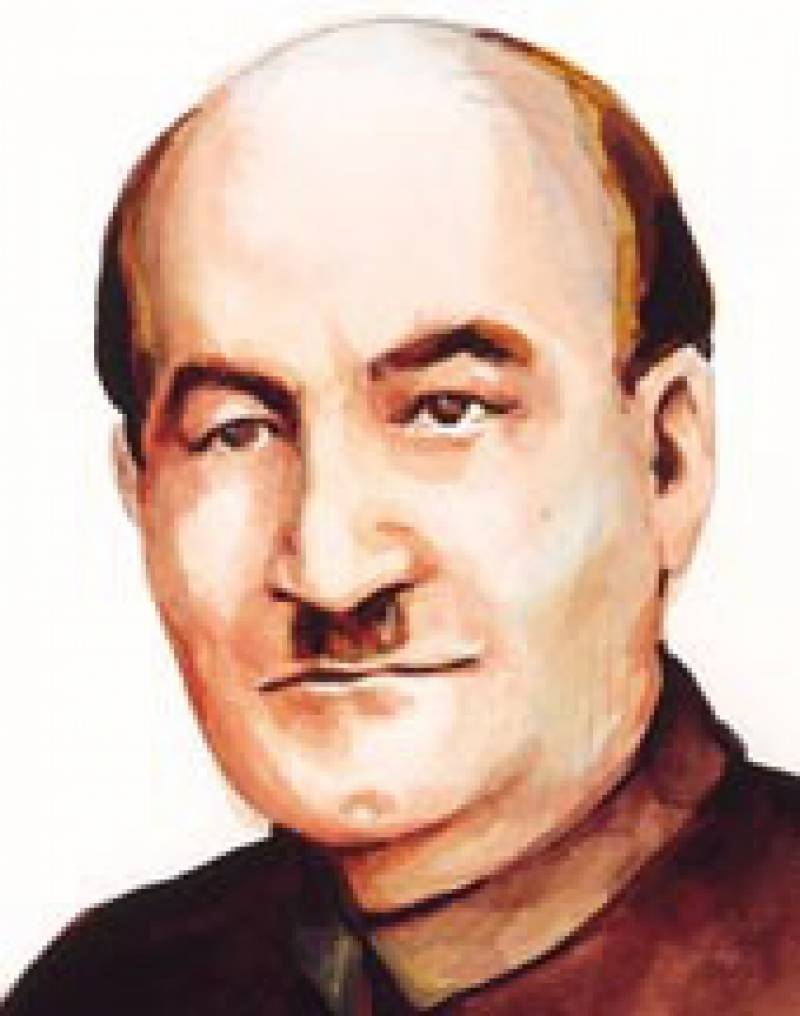LAHORE – Josh Malihabadi was a revolutionary who spread a message of hope and love through his poetry. He always held secular and human values very dear to him. He was very optimistic about the future of mankind.
Sabzay ka farsh, abr ka khaima, gulon ka itr—Gulshan main ihtmam hy kya kya teray leay
Josh always challenged the established order and stood for liberal values.
Aur tu aur khud insan baha jata hy—ketna pur hol hy tufan-e-rawayat aay Josh
Ehl-e-alfaz shariat pay maray jatay hain—Kis ko samjhaon masheyat k isharat aay Josh
Like many other great poets of Arabic, Persian and Urdu, Josh made a very rich addition in romantic poetry. He fondly recalls his love affairs, more than 18 in number, in his autobiography. His couplets in praise of his beloved arise feelings of love even inside a dead soul.
Jangle ki aag, seya rat hy yar zulf ghani hy—Kya gul badani, gul badani, gul badani hy
Yeh surkhe-ay-lab hy ya aqeeq-ay yamani hy—Kya gul badani, gul badani, gul badani hy
Josh was loud, brave who never compromised on principles. He did not work under British despite very good offers of job.
Mujh ko vo bakshtay thay do alam ki naimtain—Meray uzr-e-ishq ny inqar kr deya
He wrote over 100,000 beautiful couplets and more than 1,000 rubayat in his lifetime. His autobiography “Yadon ki Brat” is considered one of the best so far in Urdu as it is written in frank and candid manner. He did not conceal anything about his life without fear of any backlash from the traditionalists.
A known educationist and an intellectual Pervaiz Hoodbhoy has described Josh as “South Asia’s apostle of human secularism” whose dexterity and genius in transposing thoughts into words created new thoughts and expressions. Pervaiz goes on saying: “Poetry flowed from Josh’s pen like water from a bubbling spring.”
Aao phir Josh ko day k laqb-e-shah-e-sukhan—Dil-o- din-e-sukhan va jan-e-hunar taza krain
“It is true that Josh was not given his true status in his lifetime. The reasons were political and his difficult diction”, says known critic and modern poet Shahzad Nayyar.
About political reason, he said, Josh was anti-establishment and anti-religiosity, the trends which dominated the thoughts of many in his time. Josh’s opposition of Pakistan Movement also cost him a lot though he wrote famous national songs afterwards, viewed Nayyar.
Talking about the literary reason, he said Josh Sahib used heaps of words in his poetry not portraying a catchy message for the common readers which could be seen in the poetry of Iqbal and Faiz. He said Josh perhaps added most vocabularic poetry in our national language after Mir Taqi Mir.
“Josh sahib’s poetry is full of vocabulary but it lacks clarity for the common readers. Perhaps he is considered top in the list of Urdu literature who uses thousands of high sounding rich words in his poetry,” said Shahzad Nayyar, adding despite this Josh was no doubt among one of the leading literary icons of Indo-Pak. “His message is great and deserves to be celebrated and spread in our terror-hit society. It is a message of hope, love and human equality”, Nayyar observed, adding that though he was ignored in his life, Josh was now getting back the status he deserved.
Shabbir Hasan Khan with his pen name Josh born in Maliabad, a town 13km away from Lucknow in 189os (Josh himself wrote he did not know about his accurate date of birth), in a landlord family of Afridi Pathans who settled there some three centuries before his birth, he studied in known educational institutions run under British and Muslim elite of those times and enjoyed close company and friendship of leading scholars, poets and politicians like Mirza Hadi Ruswa, Jawahar Lal Nehru, Maulana Abualkalam Azad, Rabinder Nath Tagore, Sarojni Naidu in his young age. He inherited poetry from his father, grandfather, uncles, maternal grandfather, mother, aunts and grandmothers.
He was revolutionary Marxist, romantic, witty, supporter of United India (though he later backed Pakistan Movement as he himself described in his autobiography) and great lover of Urdu. It was his love for the national language which compelled him to migrate to Pakistan after a decade of independence against the advice of his close friend and the then India’s prime minister Jawahar Lal. He had belief Urdu would not get true status in India due to “narrow minded nationalism of Hindus.”
Coming into Karachi, he had to face countless conspiracies and opposition from the typical right-wingers of that time. His property was confiscated during first marshal law of Ayub Khan, his poetry did not get due recognition and he died on February 22, 1982 with memories of his flourishing past, the great civilization of Lucknow and shedding tears on the gloomy picture of Urdu and Pakistan.
Soz-e-gham day k mujhay os ny yeh irshad keya—Ja tujhay kashmakash-e-dehar say azad keya
Josh made some interesting observations about his contemporaries in his autobiography, “Yadon ki Brat.”He says: “Faiz wrote good poetry but spoiled it by poor recital. Iqbal was a genius but borrowed his idea of shaheen from Nietzsche. Majaz took 75 per cent of his poetry to grave because of early death otherwise he may have surpassed everyone else. Feraq was a jewel in the crown of Urdu poetry but remained unappreciated in India. Mustafa Zaidi’s poetry was modern, graceful and unique.”
About Tagor, he wrote: “I found Tagore larger than life, sensitive, frank and fond of beauty but somewhat of an exhibitionist.” Nehru was his ideal.
On Wednesday was Josh’s 35th death anniversary which largely went unnoticed as no private or official sitting was organised to remember the great poet. But some private TV channel including the state run PTV did ran short documentaries to pay homage to him. One hopes that Shair-e-Inqlab (poet of revolution) finds mention at a three-day literary festival starting tomorrow at Lahore.






